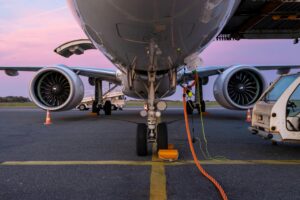A quiet revolution is taking place in African skies. Within just a few weeks, Uganda Airlines launched flights to Nigeria, Air Algeria announced upcoming service, and Nigerian-based Viva Jets initiated private jet operations targeting African destinations. These moves signal something much larger: a scramble for position in Africa’s evolving air transport network, with Nigeria emerging as a crucial piece in the continental puzzle.
For decades, the absurdity of African air travel has been a source of frustration for business travelers and tourists alike. Flying between African countries often meant connecting through Dubai, Paris, or London—adding hours, cost, and complexity to what should be straightforward journeys. Now, airlines across the continent appear ready to solve this long-standing problem.
Why Nigeria Is Suddenly Attractive
Nigeria’s appeal to African carriers stems from a combination of market size, geography, and regulatory opportunity. With over 200 million people and the largest economy in Africa, the potential passenger volume alone makes Nigeria appealing. But there’s more to the story.
“The location of Nigeria makes it a target for 5th freedom flights,” explains Sindy Foster, Principal Managing Partner at Avaero Capital Partners. “Also, the fact that there are lots of airports still not accessible via the African continent from Nigeria will mean that it will remain a target for more airlines.”
Airlines operate on what industry insiders call “behind and beyond traffic”—collecting passengers from one location and delivering them to another, often through centralized hubs. Nigeria’s strategic position in West Africa makes it ideal for this hub-and-spoke model.
The Bilateral Air Service Agreements (BASA) Nigeria has established with various countries and Nigeria’s participation in the Single Africa Air Transpor Market (SAATM) creates favorable conditions. These agreements determine which airlines can fly between countries, how frequently, and with what rights. For ambitious carriers looking to expand their networks, these agreements open doors.
Fifth freedom rights—the ability for an airline to carry passengers between two foreign countries as part of a service connecting to its home country—are particularly valuable. For example, an airline could fly from its home country to Nigeria, pick up more passengers, and continue to a third destination, maximizing the efficiency and profitability of its routes.
Everyone Wins In Enhanced Connectivity
The rush to establish new air links to and from Nigeria creates benefits that extend far beyond the airlines themselves.
“The truth is everyone benefits by better air connectivity,” Foster notes. “The direct and indirect benefits of aviation are well publicized. Bringing investors to and from Nigeria, creating tourism opportunities, saving costs, reducing travel time.”
For Nigerian businesses, more direct international connections mean easier access to regional markets and potential partners. The time savings alone can transform business opportunities that were previously impractical due to travel constraints.
Travelers gain more convenient options and potentially lower prices as competition increases. Instead of day-long journeys with multiple stops, direct or single-connection flights can slash travel times dramatically.
Even the cities and countries linked by these new routes stand to gain. Aviation connectivity correlates strongly with increased trade, investment, and tourism. When cities become more accessible, they become more attractive for business and leisure travel.
Foster emphasizes this point: “We should not look at it as losing. We should focus on the gains.”
A Catalyst For Nigeria’s Aviation Sector
For Nigeria’s own aviation industry, the influx of foreign carriers creates both opportunities and challenges. Airport authorities will see increased landing fees and passenger service charges. Ground handling companies, catering services, and other auxiliary businesses will experience higher demand.
Local airlines may face increased competition on some routes but could also benefit from partnership opportunities with foreign carriers. Codeshare agreements, interlining, and other cooperative arrangements could help Nigerian airlines extend their reach without massive capital investments.
The increased traffic could also accelerate infrastructure improvements at Nigerian airports. As passenger volumes grow, there will be greater incentive and resources to upgrade terminals, improve ground transportation, and enhance the overall passenger experience.
Most importantly, these developments could spur Nigerian carriers to improve their own international offerings, potentially leading to a stronger, more competitive domestic aviation sector.
More African Airlines Will Follow
The current wave of new service announcements likely represents just the beginning of a broader trend. When asked if more African airlines will commence flights to Nigeria, Foster is unequivocal: “Absolutely.”
The business logic is compelling. As airlines seek to optimize their networks and find new revenue opportunities, the gaps in Africa’s connectivity map represent low-hanging fruit. For too long, African travelers have endured circuitous routings through distant continents. Each new direct connection captures a portion of this underserved market.
“Nigerians will be able to access the continent and beyond without going through Europe, Middle East or North America,” Foster points out.
Airlines like RwandAir, Ethiopian Airlines, and Kenya Airways have already built significant pan-African networks. Others are likely watching the moves into Nigeria with interest, evaluating their own potential entry points.
Completing Africa’s Air Transport Network
The broader significance of these developments extends beyond Nigeria. What we’re witnessing is part of a gradual completion of Africa’s air transport network—filling in missing connections that have hampered intra-continental travel and trade.
The African Continental Free Trade Area agreement aims to create the world’s largest free trade area. But goods and people need to move efficiently for such an agreement to deliver its full potential. Every new air link helps build the transportation infrastructure necessary for successful economic integration.
For decades, African air travel has been defined by what it lacks—direct connections between major cities, competitive pricing, and convenient schedules. The current developments suggest aviation leaders are finally addressing these gaps.
Nigeria’s emergence as a focal point for this expansion makes geographic and economic sense. Its position allows airlines to create efficient connections between North, West, Central, and Southern Africa.
While challenges remain—including regulatory harmonization, infrastructure limitations, and high operating costs—the trajectory is clear. Africa’s aviation map is being redrawn, and Nigeria is increasingly at its center.
As Foster succinctly puts it: “The location of Nigeria makes it a target.” That target status is quickly translating into tangible connections, promising a future where traveling within Africa no longer requires leaving the continent first.
Disclaimer: The insights shared in this article are for information purposes only and do not constitute strategic advice. Aviation markets and circumstances vary, and decisions should be based on your organisation’s specific context. For tailored consultancy and guidance, please contact info@avaerocapital.com.




